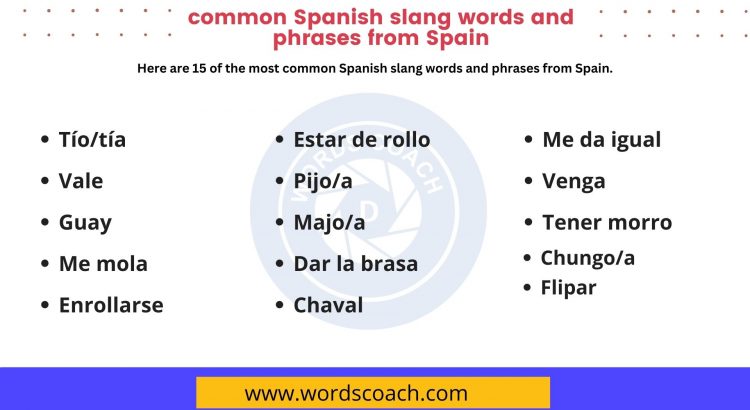Common Spanish slang words and phrases from Spain
Here are 15 of the most common Spanish slang words and phrases from Spain:
- Tío/tía – Literally meaning “uncle/aunt”, this is a commonly used term in Spain to refer to a friend or acquaintance. “Qué tal, tío?” (What’s up, dude?)
- Vale – Similar to “OK” or “alright”, this word is often used to confirm agreement or understanding. “¿Quedamos a las 8?” “Vale” (Shall we meet at 8? Alright)
- Guay – Meaning “cool” or “awesome”, this slang term is popular in Spain. “Esa camiseta es guay” (That t-shirt is cool).
- Flipar – Meaning “to be amazed” or “to be blown away”, this is a common slang term used to express astonishment or excitement. “Flipé con la fiesta de ayer” (I was blown away by the party last night).
- Me mola – Meaning “I like it”, this expression is commonly used to express a positive opinion about something. “Ese coche me mola” (I like that car).
- Enrollarse – Meaning “to chat” or “to talk at length”, this slang term is often used to describe a conversation or interaction with someone. “Nos enrollamos hablando de música” (We chatted for ages about music).
- Estar de rollo – Meaning “to be in the mood” or “to be down for something”, this expression is used to indicate a willingness to do something. “Estoy de rollo para salir esta noche” (I’m down to go out tonight).
- Pijo/a – Meaning “posh” or “snobbish”, this slang term is often used to describe someone who is perceived as pretentious. “Ese chico es un poco pijo” (That guy is a bit snobbish).
- Majo/a – Meaning “nice” or “kind”, this term is used to describe someone who is friendly or pleasant. “Esa chica es muy maja” (That girl is very nice).
- Dar la brasa – Meaning “to be a nuisance” or “to be a bother”, this expression is often used to describe someone who is being persistent or annoying. “Deja de darme la brasa con ese tema” (Stop bothering me about that subject).
- Chaval – Meaning “kid” or “young person”, this term is often used to refer to someone who is younger than the speaker. “Ese chaval parece muy listo” (That kid seems very smart).
- Me da igual – Meaning “I don’t care” or “it’s all the same to me”, this expression is often used to indicate a lack of preference or opinion. “¿Qué quieres hacer hoy?” “Me da igual” (What do you want to do today? I don’t care).
- Venga – This expression is often used to encourage someone or to urge them to do something. “Venga, ¡anímate!” (Come on, cheer up!).
- Tener morro – Meaning “to have nerve” or “to have audacity”, this expression is often used to describe someone who is being cheeky or brazen. “Tiene mucho morro para pedirme eso” (He’s got a lot of nerve to ask me that).
- Chungo/a – Meaning “shady” or “dodgy”, this term is often used to describe something or someone that seems suspicious. “Ese sitio parece un poco chungo” (That place seems a bit shady).
The Spanish use lots of unique and interesting slang to express how they feel about the world around them.






